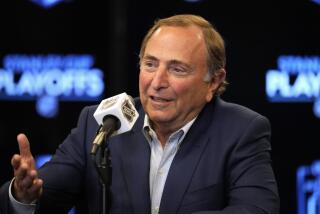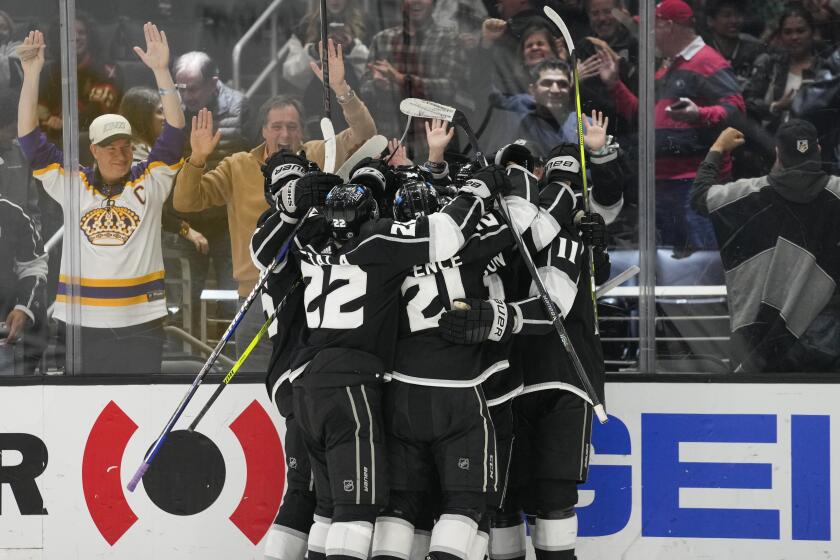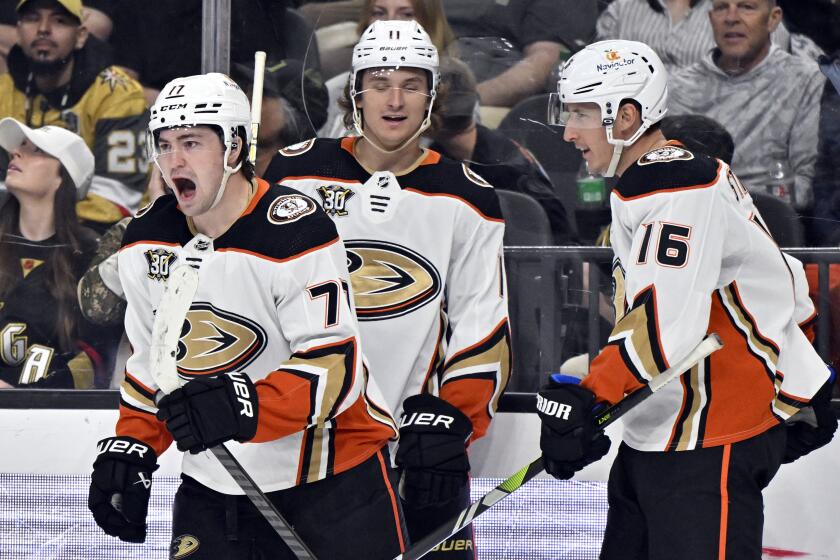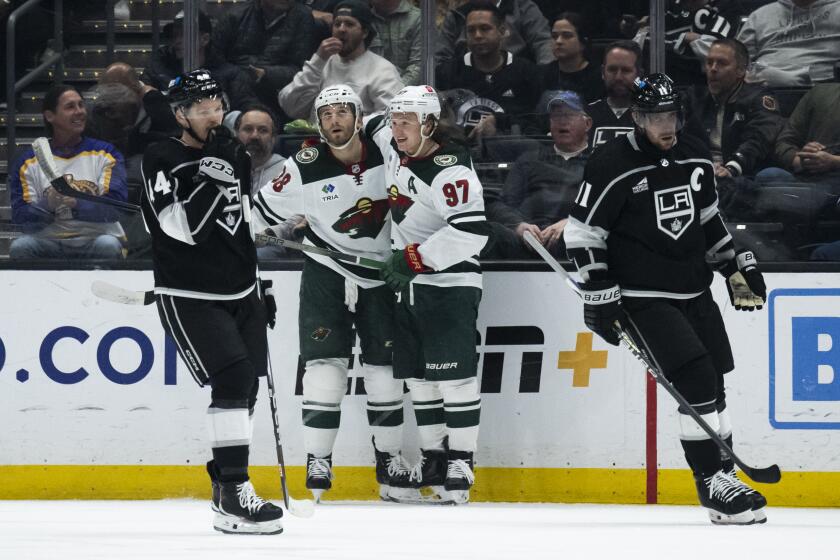They Should Have Let Mouse Roar
Bruce McNall’s best scam was legal: He persuaded Michael Eisner, then chairman of the Walt Disney Company, to buy an NHL franchise for the new arena in Anaheim, a deal that would benefit the Disney empire and, not secondarily, McNall.
But before committing to the project, Eisner had a question.
“His kids had played, so he knew hockey from the standpoint of a father watching his kids play,” McNall said, “but he’d never watched an NHL game. I took him to some games and talked to him about it and he said, ‘How much is the league going to pay us to come in?’ ”
McNall informed him the process didn’t work that way. Besides, Eisner would be infringing on the market McNall claimed as owner of the Kings. They agreed Disney would pay $25 million to the NHL and $25 million to McNall for territorial infringement.
“At the moment, I was just a little short,” said McNall, who later spent nearly four years in prison after pleading guilty to two counts of bank fraud and one each of wire fraud and conspiracy involving $236 million.
“The $25 million came in handy and kept me going another three weeks or so.”
Disney and the Ducks kept going for more than a decade, until Friday’s announcement that the club had been sold for $75 million to Orange County entrepreneur Henry Samueli and his wife, Susan.
To McNall, who was there at the beginning, the ending was unspeakably sad.
Still a fan of the game and a friend of Eisner’s -- McNall got letters from him while in prison and he made Eisner a wallet -- McNall believes the NHL drove the Disney chief away, even though Eisner’s marketing savvy could have brought immense riches to a league that was built on family fiefdoms and had no clue how to promote itself.
Traditionalists were livid when the Ducks took their name from a kids’ movie and introduced an aggressive marketing plan. The Ducks entertained fans with a mascot, on-ice cheerleaders and laser shows, which have become standard in Toronto and Calgary and other cities that once considered such sideshows beneath them.
The Ducks became a marketing textbook for rival clubs after they played to 99.3% of capacity in their first five seasons and marketed their merchandise to the same stratospheric levels as the NFL’s Dallas Cowboys and baseball’s New York Yankees. In 1993-94, their inaugural NHL season, the Ducks made $11 million in merchandising; in April 1995, Financial World magazine pegged the franchise’s value at $108 million, tied for second with the New York Rangers and behind the Detroit Red Wings, two of the NHL’s “Original Six” clubs.
Eisner was laughed at for suggesting shootouts should be instituted to settle ties, that the nets should be widened to increase scoring and the center-ice red line should be ignored while passing, all to boost scoring and create a good show. Yet, all of those ideas were on the menu of fan-friendly experiments the NHL planned to try if it had resolved its labor woes in time to play a shortened schedule.
“Disney is not Disney for nothing,” McNall said Friday. “The most upsetting thing is people didn’t pay attention to him. He had concepts he wanted to talk about and the old traditionalists said, ‘No, no.’
“And see where they are now.”
In the Ducks’ early years, Eisner was a constant presence at the Arrowhead Pond, usually sitting in a suite and wearing a cap pulled low over his brow. His sons often visited the locker room but he stayed out of the way, insisting the focus should remain on the players.
As Disney’s empire grew, he had less time to spend around frozen ponds. Disney bought ABC/ESPN. It opened new theme parks. Eisner’s influence was felt in the NHL’s five-year, $600-million TV contract with ABC/ESPN, a deal that expired after last season and will never be equaled. But Eisner, who didn’t respond to an interview request, distanced himself from the team he once followed with a fan’s passion.
“I think he got frustrated by the fact he’d go to [NHL] meetings and discuss things and it would be a crazy situation where somebody would say to him, ‘You’re a newcomer. Why should we listen to you?’ ” McNall said.
McNall, now working for a film production company, said he hadn’t spoken to Eisner for several months. However, he guessed that Eisner must have felt a pang of regret on Friday.
“I don’t think he’s overly thrilled about it,” McNall said. “In some way it has to affect him emotionally. It’s not his decision: He has to answer to stockholders and he’s doing what’s in their best interest.
“But I’ll tell you, those first few years, that was quite a time.”
More to Read
Go beyond the scoreboard
Get the latest on L.A.'s teams in the daily Sports Report newsletter.
You may occasionally receive promotional content from the Los Angeles Times.







